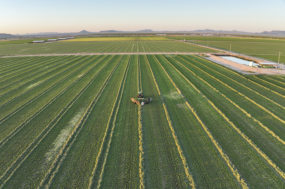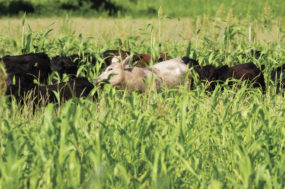If you have read any of my articles in previous years, you know how much I love the fall. And it’s not just for the cooler temperatures, the harvest season or the changing color of the leaves – it’s also for the sunsets.
It seems the timing is nearly perfect most evenings on my drive home to get to see the beautiful array of colors and clouds that, to me, almost perfectly represent the majesty of a kind and loving Creator that not only wants to bring a smile to my face but also serve as a reminder to me of His benevolence.
I think of God’s kindness when I see these sunsets and the brilliant colors of the fall leaves. I remember it when I look at the jagged mountain peaks and smell the fresh pine needles on a walk through the forest or hear the melodic sound of birds in the trees next door as I admire the last lingering flowers and produce in our gardens.
All around me are amazing things to see, smell, hear and touch. Add to that the many other blessings and comforts of life that I enjoy daily – family, food, shelter, transportation and so much more – and how can I not feel thankful?
When I am paying attention (and sadly, it’s easy to get caught up in the “busy” of life and not take time to notice), I look on these things as little “gifts” in my day, and I just can’t help but feel happy. Christine Carter has been quoted as saying, “Happiness is a sort of higher emotion of true astonishment at the wonders of the world or awe. Gratitude slips right in there as the expression of that happiness.”
I feel an extreme amount of gratitude for the world and things around me, and I experience the sense of reverence and awe both Milton and Carter refer to in the quotes above. But how does that epiphany, or sudden realization, change my life? Does it cause me to act or do anything different? I propose that it certainly should – but does it?
Watch the evening news, open any newspaper or check your social media feed these days, and it doesn’t take long to find many of the things wrong in the world today – political and social unrest, abuse, poverty, discrimination and so much more.
It’s easy to let those things overshadow the blessings and abundance that are also present in our lives. But we can’t dwell on the negative or feel discouraged. We need to be aware, to take notice of how blessed we truly are. No matter what our individual circumstances or situation, there is always something to be thankful for.
But just taking note is not enough. If all we do is make a list and move on, I think we’ve at least partially missed the point. As I have thought about it more this year, I have realized that recognition should also change our behavior.
William Arthur Ward once stated, “Feeling gratitude and not expressing it is like wrapping a present and not giving it.”
In other words, gratitude should be motivating, something that cultivates a desire to do good. But how can we manifest that thankfulness?
I’m going to sum it up in a single word, one that I used earlier in this article: kindness. Surely there can never be too much of that in our daily interactions with others.
My son recently came home from school, talking about a sentence they had to journal about in English class.
His teacher had written on the board:
Kindness, empathy and compassion are nouns, but they should be verbs.
Think about that for a few minutes. If we are using kindness as an expression of the blessings we have received, it implies that we will do something.
In a talk given by Betty Jo Jepsen, she said, “Kindness has many synonyms – love, service, charity. But I like the word kindness because it implies action. It seems like something you and I can do…. We can develop our own sort of ‘kindness instinct’ by consciously seeking opportunities to act kindly.”
What a marvelous idea! And did you see how she stated it was “consciously seeking opportunities”? Every day presents multiple occasions for us to be grateful by showing kindness to those around us.
And it doesn’t have to be anything big or time-consuming – it might be something as simple as giving a smile or sincere compliment, being a little more patient in the grocery store checkout line or on the road, forgiving someone who has offended you or saying “thanks” for something done for you.
The amazing thing about this is that it has the ability to literally change the world around us for the better, one kind act at a time.
Lloyd D. Newell, in a broadcast called “Music and the Spoken Word,” said, “Everyone who tries to [be kind] – in homes, in workplaces, in communities – discovers the same thing: When we simply practice genuine kindness, other desirable qualities – respect, honesty, trust, fairness and affection – all blossom and grow.”
And J.R.R. Tolkien’s character Gandalf in the book Fellowship of the Rings sums it up beautifully, “I found it is the small everyday deeds of ordinary folk that keep the darkness at bay … small acts of kindness and love.”
This Thanksgiving season, may we all not only be aware of our blessings but show that gratitude by remembering to be kind and become as Joseph B. Wirthlin describes: “Kindness is the essence of greatness and the fundamental characteristic of the noblest men and women I have known. Kindness is a passport that opens doors and fashions friends. It softens hearts and molds relationships that can last lifetimes.” FG












